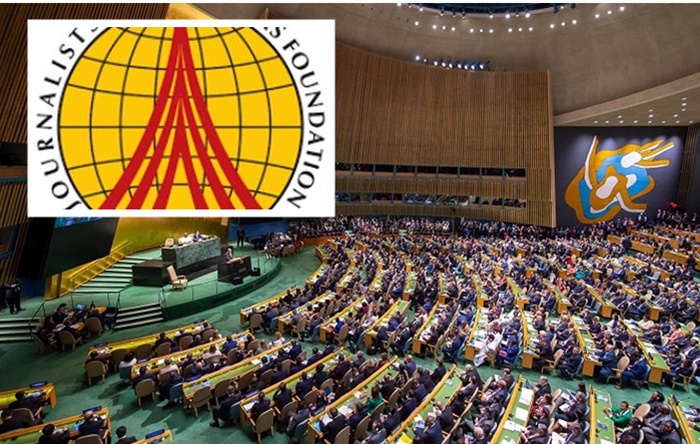The virtual UNGA Conference 2021: Transforming Our World, organized by the New York-based Journalists and Writers Foundation (JWF) and its 36 global partners, on Wednesday focused on the importance of worldwide collaboration and cooperation to overcome the social, economic and environmental challenges facing the world by achieving the UN’s 2030 Agenda for Sustainable Development.
The 2030 Agenda and its 17 Sustainable Development Goals (SDGs) was adopted in 2015 by all United Nations members. The SDGs, also known as the Global Goals, refer to a universal call to action to end poverty, protect the planet and ensure that by 2030 all people enjoy peace and prosperity.
Held on the occasion of the 76th Session of the UN General Assembly, the JWF’s flagship event, which took place on Wednesday from 10:00 a.m. to 4:00 p.m. (EST), included three panels that saw the participation of an interdisciplinary group of 28 distinguished panelists and high-level speakers from 15 countries.
During the six-hour virtual event, the participants discussed methods to accelerate progress in the implementation of the SDGs, to overcome the devastating effects of climate change on human life and the planet and the ways to reach quality education in the post-COVID era.
The first panel, moderated by Prof. Patricia Kunrath, an anthropologist from Brazil, focused on multi-stakeholder partnerships that require different sectors working in collaboration by mobilizing their financial resources, assets, knowledge and expertise to achieve the SDGs.
Dana Coppola, the public relations and media specialist at Embrace Relief, a non-profit organization that delivers humanitarian aid and disaster relief to vulnerable communities around the world, talked about the humanitarian work of Hizmet movement volunteers in different parts of the world, especially in terms of education and healthcare.
“The civil society organizations, such as the Embrace Relief, utilize 17 SDGs to further the 2030 agenda. … We have seen and continue to see that through partnership and volunteerism and help, they can continue to deliver humanitarian assistance to those who need it most, where they need it most,” Coppola said.
The Hizmet movement, also known as the Gülen movement, is a faith-based group that focuses on science education, volunteerism, community involvement, social work and interfaith and intercultural dialogue. The movement is inspired by the teachings of Muslim preacher Fethullah Gülen.
President Recep Tayyip Erdoğan, who has been targeting followers of the movement since the corruption investigations of December 17-25, 2013, which implicated then-Prime Minister Erdoğan, his family members, and his inner circle, intensified the crackdown on the movement following an abortive putsch on July 15, 2016. He designates the movement as a terrorist organization and accuses them of masterminding the coup attempt while the group strongly denies any involvement in the failed putsch or any terrorist activities.
The second panel, moderated by Takahisa Taniguchi, an environmental activist from Japan, undertook a review of six years of action and progress made on climate change to reduce ecological threats that pose great risks to the timely achievement of the SDGs.
The panel discussed the themes of climate change, gender equality and climate crisis calling for global response and the impact of increasing ecological threats on future levels of conflict and migration.
Dr. Rajendran T. Govender, executive director of Mzansi Empowerment Enterprise and a social cohesion advocate from South Africa, moderated the third panel, which covered the topics of long-term implications of unequal access to education during the pandemic, opportunities and challenges of remote learning, an overview of global access to digital technologies and girls’ education and women’s empowerment in the era of digital technologies.
In the closing speech, JWF president Mehmet Kılıç underlined the importance of engaging young people who want to make a difference in society to express their ideas on sustainable peace, climate change, gender equality, social justice and other issues, into the collective effort to achieve the SDGs.
“COVID-19 taught us at least one lesson, that the crisis doesn’t discriminate by race, religion, ethnicity or gender. … Likewise, climate change is a global threat and an environmental crisis that requires partnerships, collective effort and actions. So, as governments, the private sector and civil society, we must work in collaboration and cooperation to overcome the social, economic and environmental challenges,” Kılıç said.
He added that the JWF and its global partners are committed to an inclusive, transformative and achievable UN development agenda for humanity and the planet that will help achieve the global mission of leaving no one behind.



